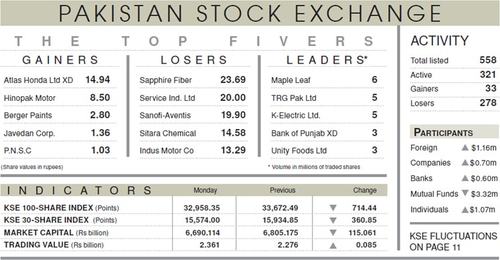
KARACHI: In a tightly worded statement, the State Bank of Pakistan on Tuesday announced a hike of one percentage point in the key policy discount rate. The action, taken by the Monetary Policy Committee (MPC), brings the key rate, on which all other interest rates in the economy are pegged, to 13.25pc. In the same announcement, the central bank dropped a broad hint that no further rate hikes or depreciation of the exchange rate are now necessary.
“With this decision on interest rates, the MPC is of the view that the adjustment related to interest rates and the exchange rate from previously accumulated imbalances has taken place,” the statement said.
The State Bank retained some space for itself to act again in the future, “depending on economic developments and data outturns” as well as “greater than expected softening in domestic demand and downward revision in projected inflation”.
On the exchange rate too, the State Bank tried to reassure markets. “The bulk of the needed adjustment in the real effective exchange rate to address the past overhang of overvaluation has been completed with the recent deprecation of the exchange rate,” the statement said. It added that foreign exchange reserves are now expected to rise, from $8 billion on July 12, “on account of additional financial inflows from other international creditors, including those related to the Saudi oil facility and continued improvement in current account deficit”.
SBP hints end of monetary tightening, exchange rate also in balance
The statement emphasised that the exchange rate remains “flexible and market determined that SBP stands ready to take action to address disorderly market conditions in the foreign exchange market”.
The State Bank also revised the growth projection for the current fiscal year, saying it expects GDP to grow at 3.5pc by June next year, higher than the IMF projection of 2.4pc for the same period. On inflation too, the SBP projected the Consumer Price Index to rise to 11-12pc by the end of the fiscal year, lower than 13pc projected in the budget. Inflation will moderate by the middle of the fiscal year and then recede for the remaining months, the SBP projected.
“The MPC is of the view that real interest rates implied by these inflation projections and today’s policy rate decision are at appropriate levels considering the cyclical weakening of aggregate demand,” the SBP said, hinting that no further interest rate hikes should be necessary unless data down the road shows significant deviation from these projections.
All eyes now turn to the latest auction of Treasury Bills scheduled for Wednesday (today), since all previous auctions for almost a year and a half have seen weak participation by the banks. With the discount rate at 13.25pc, the government will be in a position to offer higher yields to the banks for its three, six and 12-month papers. Banks offered bids closer to 13.30pc in the last auction.
With its language, the SBP seems to be telling the banks that this rate is here to stay and they need to step forward now. Whether or not the banks acknowledge the signal will be seen by end of the day (Wednesday) when the results of the auction will be announced. Up to Rs638.5 billion in treasury bills are maturing on Wednesday, of which the government intends to rollover Rs600bn and retire the rest.
Private sector credit (PSC) growth has started decelerating, the SBP pointed out. PSC expanded 11.4pc during July 1-June 28 FY19 as compared to 14.8pc during the same period last year. PSC is sometimes used as a barometer of economic conditions, with higher credit disbursements thought to be a sign of more vibrant economic activity.
For a few months earlier this year, PSC grew and then finance minister Asad Umar took the opportunity to claim that the economy has turned the corner. But the SBP once again poured cold water on that prognosis, saying that “the increase in PSC was largely driven by higher input prices, which in turn increased the working capital needs of the businesses”.
Published in Dawn, July 17th, 2019













































